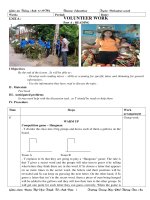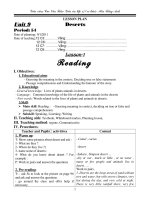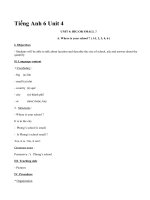GA-TA-12- Unit 4 ( C.Tien)
Bạn đang xem bản rút gọn của tài liệu. Xem và tải ngay bản đầy đủ của tài liệu tại đây (134.9 KB, 12 trang )
Giáo viên: Cao Văn Tiến- Giáo án lớp 12 (cơ bản)- Môn Tiếng Anh
Lesson plan
Unit 4
School education system
Date of planning:
Date of teaching:
Lesson:1
Reading
I. Objectives:
1. Educational aims:- Guessing meaning from context.
- Scanning for specific information.
- Passage comprehension.
2. Knowledge:- Học sinh có thể đọc hiểu đợc về hệ thống giáo dục phổ thông ở Anh
- Học sinh hiểu và sử dụng đợc các từ mới qua các hoạt động nói, hỏi và
trả lời.
3.Skill:
Main skill: Reading
Subskill: Speaking, Listening, Writing
II. Teaching aids: Textbook, Whiteboard markes, Planning lesson,
III. Teaching method: regrate, Communicative
IV. Procedures:
Teacher and Pupils activitives Content
1. Warm up:
T: write on the blackboard and ask questions.
T: what is this?
T: what do you see now?
P: Two eyes/a pair of glasses/ two letters 0
And now?
T: Now make a meaningfull word by filling
the blanks with suitable letters
P: work in class
T: Now today we are going to learn about
School education systerm in England.
2. Pre-reading:
T: Give some new words appearing in the
Reading
P: listen and take note
T: ask them to repeat one or two times
Acircle/ the letter 0
00
SC-H-00-LING-
Compulsory (a) : bắt buộc
Academic: (a) thuộc nhà trờng
Parallel (a ) song song
Category (n): loại hạng
Fee- paying: trả học phí
1
Gi¸o viªn: Cao V¨n TiÕn- Gi¸o ¸n líp 12 (c¬ b¶n)- M«n TiÕng Anh
P: listen and repeat.
3. While-reading:
T: How many paragraphs are there in the
reading? What are they about?
P: read the reading quickly and answer the
questions
T: check in front of the class.
P: part 1: Academic year
Part 2: school systerm
part 3: National curriculum.
T: now scan the reading text and find out the
words having the equvalent meaning
P: work individually and exchange in pairs.
T: check in front of the class.
T: read the passage again and answer the
questions:
P: work in pairs and answer the questions and
then exchange each other.
T: call some students to present in front of the
class.
P: remark the answers.
4. Post-reading:
T: work in groups of four or five tell the
others one of the most difficult school
subjects you are studying and what you
would like……
P: work in groups and talk each other
T: correct
Curriculum: ch¬ng tr×nh m«n häc
Core: träng t©m
Task 1: Find words or phrases in the reading
passage which have …
1. state schools
2. primary education
3. secondary education
4. compulsory
5. the General Certificate of Secondary
Education.
6. curriculum
Task 2: Answer the questions.
1. From the age of 5.
2. 3 terms
3. The state school and the independent or “ ”
public school systerms.“ ”
4. yes
5. There are 3 core subjects ( English,
Maths, and Science).
6. When the students finish the secondary
school, they can take an examination called
the General Certificate of Secondary
Education
Work in groups: tell the other one of the
most difficult school …
(SGV )I find history very difficult. It s too ’
long to remember all the historical events. I
would learn it better if the teacher could
help with a short description of each event.
5. Home work: - Summarize the main points.
- Assign homework.
- Prepare new lesson.
6. Comment: ……………………………………………………………………………….
……………………………………………………………………………….
……………………………………………………………………………….
Lesson plan
Unit 4
School education system
2
Giáo viên: Cao Văn Tiến- Giáo án lớp 12 (cơ bản)- Môn Tiếng Anh
Date of planning:
Date of teaching:
Lesson:2
Speaking
I. Oblectives:
1. Educational aims: -Talking about the school education system in Vietnam.
2. Knowledge:- Tiến hành đợc những hội thoại đơn giản nói về các hệ thống giáo dục phổ
thông ở việt nam
- Học sinh thực hành hỏi đáp về giáo dục ở Viêt Nam.
3.Skill:
Main skill: Speaking
Subskill: Reading, Listening, Writing
II. Teaching aids: Textbook, Whiteboard markes, Planning lesson,
III. Teaching method: regrate, Communicative
IV. Procedures:
Teacher and Pupils activitives Content
1. Warm up:
T: write on the board a list of
schools
T: there are the names of levels of
education, put them in right order
from low to high level
P: work in groups.
T: check in front of the class.
P: give their answers.
T: today we are going to talk
about school education syaterm
in Vietnam.
2. Pre-speaking:
T: Study the table on page 45 and
practice asking and answering
questions about the school
education systerm in VN.
P: read through the informations in
the table.
T: go around and help about the
pronunciation and new words.
T: call 2 Sts to make a conversation
University, nursery, primary school, collage,
kindergarten, secondary school,
Suggested :
nursery, kindergarten, primary school, secondary
school, collage, university.
Task 1: Work in pairs. Study the table below then ask
and answer
Useful expression:
- When do children in Vietnam go to?
- How old are children when they first go to?
- How long is the primary school?/ How many years
do children attend primary school?
- Which level do children move to after they finish?
- Do all children have to go to nursery?
Model:
A: Hi! Are you a student of this school?
3
Giáo viên: Cao Văn Tiến- Giáo án lớp 12 (cơ bản)- Môn Tiếng Anh
P: practice speaking in pairs
T: go around and help if necessary.
3. While-speaking:
Theo nhóm HS luyện nói về hệ
thống giáo dục phổ thông ở Việt
Nam dựa vào các thông tin cho
trong task 1. GV có thể để học sinh
nói từng cấp học, số lợng lớp trong
từng cấp và độ tuổi của học sinh.
T: Work in groups and talk about
the school education systerm in
Vietnam, using information in task
1.
P: Work in Groups
T: go around and help if necessary.
4. Post-speaking:
Theo nhóm: Yêu cầu học sinh tìm
những điểm khác biệt giữa hệ
thống trờng học ở Việt Nam và nớc
Anh dựa vào nội dung bài đọc. So
sánh thông tin ở 2 bảng
T: Work in groups. Talk about the
similarities and differences
between the school systerm in
Vietnam and England.
B: Yes! You are new here, right? Where are you from?
A: I m from America. And I am interested in the
Vietnamese education systerm. Girls look so nice in
their ao dai .
B: Thank you. We like it too.
A: Can you give me some information about the
education systerm in Vietnam?
B: It s OK. Go ahead!
A: How old are children in Vietnam when they first go
to school?
A: Thank you for letting me take up so much of your
time.
B: you re welcome.
Task 2: Work in groups. Talk about the school
education systerm in
A: In Vietnam, children can go to a nursery when they
are only 3 or 4 years old because their parents have to
go to work.
B: I am sure they cry a lot because they are too young
to be far from their parents for the whole day.
C: But they soon make friends and have a lot of toys to
play with. After nursery, they go to kindergarten and
stay there until 5.
A: Yeah, in kindergarten children have more friends.
School life is better because they can learn singing,
dancing, drawing, and even more simple words. What
they like best is being told stories.
C: At the age of 6 they move to primary school. All
primary school in Vietnam are coed- male and female
students study together in the same class. It takes them
7 years to finish high school. Children leave high
school at the age of 17.
B: Then they prepare for their higher study at colleges
or universities.
Task 3: Work in groups. Talk about the similarities and
differences between .
There are some difference between the school systerm
in Vietnam and England. Childrend in Vietnam start
primary school at the age of 6 and finish this leve at 10
while those in England study at primary school from
the age of 5 to 10. Schooling is complusory for
Vietnamese children until the age of 10 , but in
England, compulsory education ends when children
are 16. There is also a difference about the subjects
4
Giáo viên: Cao Văn Tiến- Giáo án lớp 12 (cơ bản)- Môn Tiếng Anh
P: work in groups.
T: go around and help if necessary.
stydied at schools.
On the other hand, Vietnam and Englad school
systerms have some similarities. St in both countries
have to follow the national curriculury set by the
government. After finishing secondary schools they all
have to take the national examination known as GCSE.
5. Home work: - Summarize the main points.
- Assign homework.
- Prepare new lesson.
6. Comment: .
.
.
Lesson plan
Unit 4
School education system
Date of planning:
Date of teaching:
Lesson:3
Listening
I. Oblectives:
1. Educational aims:- Deciding on True or False statements
- Comprehension question.
2. Knowledge:- Học sinh nghe và lấy thông tin từ cuộc nói chuyện giữa Jenny và Gavin về
Việc học tập của họ tại nhà trờng phổ thông.
- Học sinh nghe và trả lời câu hỏi liên quan việc học tập trong nhà
trờng phổ thông.
3.Skill:
Main skill: Listening
Subskill: Reading, Speaking, Writing
II. Teaching aids: Textbook, Whiteboard markes, Planning lesson, cassette player
III. Teaching method: regrate, Communicative
IV. Procedures:
Teacher and Pupils activitives Content
1. Warm up:
P: close their book
T:Write down five things that you do in your
school days.
Suggested answers:
- doing exercises
- learning lesson
5
Gi¸o viªn: Cao V¨n TiÕn- Gi¸o ¸n líp 12 (c¬ b¶n)- M«n TiÕng Anh
P: work in groups and answer in front of the
class
T: collect the answers and write on the board
T: today we’re going to listen about School
days
2. Pre-listening:
P: open their book
T: Ask and answer these questions
P: answer the question optoinal
T: ask them to read the new word will appear
in the listening.
3. While- listening:
T: you will listen to a conversation between
Jenny and Gavin about their school days.
T: ask them to read the questions 2 times
P: listen to the tapes the first times
T: check that ps can answer the questions
P: listen to the second times
T: check again
P: listen to the third times
T: correct
T: Listen again and answer the questions.
Let them to read the questions and guess the
answers
P: listen to the first times
T: check that ps can answer the questions
P: listen to the second times
T: check again
P: listen to the third times
T: correct
4. Post- listening:
T: Talk about the results of your current
exams at school…
P: work in groups and discuss
T: go around and help if necessary.
- playing sports
- taking test/exams
- listen to teachers
- making friends
- wearing iniform
- writing lesson
…………
Tearaway: impetuous and irresponsible
person.
Methodical: done in an orderly, logical way
Disruptive: causing discuption
Task 1. Listen to the conversation between
Jenny and Gavin …
Jenny Gavin
1 x x
2 x
3 x
4
5 x x
6
Task 2. Listen again and answer the
questions.
1. When he enjoiyed the subjects.
2. He found it very difficult.
3. Because they were difficult for him to do
in a short time.
4. Because he went away to boarding school
when he was quite young and he didn t like ’
that. So school days weren t the best days of ’
his life.
Work in pairs. Talk about the results of your
current exams at school …
I didn t do well in the last exam period. I ’
was content with my math, physics and
chemistry result but my English result wasn t’
very good. I made too many mistakes so I
barely passed it.
I think that I have to spend more time
studying English to get a higher grade in the
coming exam.
Tapescript
Jenny:
Look, there are questions about how you got on at school.
Shall we just go through them?
6
Gi¸o viªn: Cao V¨n TiÕn- Gi¸o ¸n líp 12 (c¬ b¶n)- M«n TiÕng Anh
Gavin:
Yes, let s’
Jenny:
OK,so. Did you always work very hard?
Gavin:
Well I certainly worked pretty hard at the subjects I enjoyed. Yes, I did. What about
you?
Jenny:
Yes, I did actually, I think I worked very hard, yeah, Now Let s come to the next ’
question.
Gavin:
Did,yeah, did you always listen carefully to your teachers?
Jenny:
No I don t think I did. No. I think I was quite disruptive, actually. What about you?’
Gavin:
Well I think I did listen to the teachers certainly when I got to the level where I was
doing the subjects that I enjoyed.
Jenny:
Yeah, OK, the next question is, did you always behave well?
Gavin:
I don t think I always well. I was, a bit,er, a bit of tearaway’
Jenny:
Um, Well, I think I was pretty well- behave on the whole, so I d say yes, yeah.’
Gavin:
Good for you! Did you pass your exams easily?
Jenny:
No I can say I did, No, I found them qite a struggle, actually. What about you?
Gavin:
I didn t pass them that easily, though I worked hard I found it very difficult to answer ’
all that long questions in a short time.
Jenny:
Yeah,yeah, exactly, What about this one, then? Did you always write slowly and
carefully?
Gavin:
Quite slowly. Essays took a long time to write and I suppose I took a bit of care, yes.
Jenny:
Yes, I agree, I was also, I was very carefull and erm, yeah,yeah, I was quite
methodical.
Gavin:
And did you think your school days were the best days of your life?
Jenny:
No,no, I can t say they were. What about you?’
Gavin:
No, I went away to boarding school when I was quite young and I din t like that, No, ’
they weren t the best days of my life.’
5. Home work: - Summarize the main points.
- Assign homework.
- Prepare new lesson.
6. Comment: ……………………………………………………………………………….
……………………………………………………………………………….
……………………………………………………………………………….
Lesson plan
Unit 4
School education system
Date of planning:………
Date of teaching:………………………………………………………………………………
………………………………………………………………………………
………………………………………………………………………………
Lesson:4
Writing
I. Oblectives:
7
Giáo viên: Cao Văn Tiến- Giáo án lớp 12 (cơ bản)- Môn Tiếng Anh
1. Educational aims:- Describing school education system in Viet Nam.
2. Knowledge:- Học sinh có thể tự viết 1 đoạn văn miêu tả hệ thống giáo dục ở Việt Nam.
- Học sinh thực hành viết 1 đoạn văn ngắn nói về những điều kiện cần thiết
Giúp việc học ở nhà trờng phổ thông tốt hơn.
3.Skill:
Main skill: Writing
Subskill: Speaking, Listening, Writing
II. Teaching aids: Textbook, Whiteboard markes, Planning lesson,
III. Teaching method: regrate, Communicative
IV. Procedures:
Teacher and Pupils activitives Content
1. Warm up:
T: write words belonging to this heading:
SCHOOLS
P: work in individually and answer in front
of the class.
T: collect the answers on the board.
T: leading to the new lesson
Describing school education sycterm in
Vietnam.
2. Pre-writing:
P: open their book and read the resquests of
the writing
T: ask some questions to help Ps
P: Read the reading again and find the
expressions and structures.
T: collect the answers and write on the board
3. While- writing:
P: in groups, write the main ideas of the
writing:
- primary
- lower secondary
- nine-year compulsory education
- school year
- GCSE examination
T: go around and help if necessary
P: give their ideas
T: write on the board.
School
Secondery high school
Junior high school
Training center
Vocation training center
Technical college
Secrectary college
Community college
.
In about 150 words, write a paragraph on the
formal school education systerm in Vietnam,
using
- How many levels of education are there in
our school systerm?
- How long does it take to complete each
level?
- How many classes are there in each level?
- When do children start Grade 1?
Suggested answer:
- The academic year in .run from
to
- The school year generally begins in
- A school year consists of .terms. to
be devided into .terms.
term is from the beginning of
- Children start grade 1 when they
are .
- Students continue school until they
are
- Schooling is compulsory for all children
from the age of to
8
Gi¸o viªn: Cao V¨n TiÕn- Gi¸o ¸n líp 12 (c¬ b¶n)- M«n TiÕng Anh
4. Post- writing:
T: ask them to work in pairs and write
P: work in pairs and exchange for each other
T: call some P to present their wrting in front
of the class and class give their ideas.
T: correct for whole class.
Suggested writing
The formal school systerm in Vietnam
consists of two levels of education, primary
and secondary education. The children start
Grade /Year 1 at the age of 6 and they
normally complete the primary education at
the age of ten.They move to lower secondary
school to study in Grade 6 when they are
eleven years old. They will finish nine-year
compulsory education when they complete
Grade 9 at the age of 14. The children may
go to upper secondary schools if they pass all
the subjects tested at the end of Grade 9.
They will stay there until they complete
Grade 12 at the age of 17. If they want to sit
for the entrance exam to universities or
colleges. They have to take the national
examination for GCSE which takes place at
the end of May or beginning of June. The
academic year in Vietnam runs from
September to May and is divided into two
terms. The first term ends in January with a
week holiday and the second term finishes in
May before a long summer holiday comes.
5. Home work: - Summarize the main points.
- Assign homework.
- Prepare new lesson.
6. Comment: ……………………………………………………………………………….
……………………………………………………………………………….
……………………………………………………………………………….
Lesson plan
Unit 4
School education system
Date of planning:………
Date of teaching:………………………………………………………………………………
………………………………………………………………………………
………………………………………………………………………………
Lesson:5
Language Focus
I. Oblectives:
9
Giáo viên: Cao Văn Tiến- Giáo án lớp 12 (cơ bản)- Môn Tiếng Anh
1. Educational aims:- After lesson, St can pronunce the words with stress in three
syllable words.
- Practice doing exercises with passive voice.
2. Knowledge:Phát âm đúng trọng âm trong những từ có 3 âm tiết (three syllable words),
Trong các từ đơn lẻ và trong cách phát ngôn.
Sử dụng đúng trong văn nói và văn viết câu có dạng bị động.
3.Skill:
Main skill:
Subskill: Reading, Speaking, Listening, Writing
II. Teaching aids: Textbook, Whiteboard markes, Planning lesson,
III. Teaching method: regrate, Communicative
IV. Procedures:
Teacher and Pupils activitives Content
1. Warm up:
T: come in the clas and greeting but dont let
them to sit down
T: Now class,
- sit down if you like studying history.
- sit down if you like studying chemistry.
- sit down if you like studying politics.
- sit down if you like studying computing.
P: sit down
T: Whats comment a
2.Presentation:
Presentation 1: Pronunciation
T: play the casette player
P: listen and reapeat
T: listen again
Presentation 2: Grammar
T: give examples and form of passive voice
P: listen and take note
T: ask them to give more examples
P: give more examples
T: give forms of the passive
P: take note
Write on the blackboard
history
chemistry.
politics.
computing.
Mathematics
English
Listen and repeat:
Algebra, carefully, politics, physical,
chemistry, academic, primary, satistics,
computing, cinema, compulsory, september
Example:
Active:
I clean my house everyday
passive
My house is cleaned everyday
Formation:
BE + PAST PARTCIPLE
Change:
S + V + O
S + be + pp + by Agent
Basic forms of the passive
Present
Is/are + p.p
Present progressive
Is/are being + p.p
Present perfect
Has/have been +p.p
past
Was/were + p.p
10
Gi¸o viªn: Cao V¨n TiÕn- Gi¸o ¸n líp 12 (c¬ b¶n)- M«n TiÕng Anh
3. Practice:
Practice 1:
T: listen and put the words into the correct
colum with suitable stress.
P: do exercises
Practice 2:
T: Fill each blank with the simple present
passive……
P: work in pairs then exchange the answers.
T: correct
4. Production:
Production 1:
T: Rewrite the following sentences using the
passive voice.
P: Work in individually then exchange in
paires
T: focus the answers and explain
Production 2:
T: Fill in the spaces of the following passage
with the correct tense in passive voice of the
verbs in brackets.
P: Work in individually then exchange in
paires
T: focus the answers and explain
Modal verb Can/must/may + be +…
p.p
Am/is/are going to +
be + p.p
Stress on the
first syllable
Stress on the
second
syllable
Stress on the
third
syllable
Algebra,
carefully,
politics,
physical,
chemistry,
academic,
satistics
computing,
september
engineer
Exercise 1. Fill each blank with the simple
present passive……
1. is divided
2. is separated
3. is set/ must be followed
4. is made up
5. is paid
6. are selected
Exercise 2. Rewrite the following sentences
using the……
1. This school was built in 1997.
2. This dictionary was first published in 1870
3. A surprise party is going to be organized by
the students in my class tomorrow evening.
4. The kitchen is being painted now
5. Romeo and Julet was writen by ‘ ’
Shakespeare in 1605.
6. Shakespeare s tragedies have been ’
translated into many languages.
7. A new primary school has just been built in
my village.
8. English will be spoken at the conference.
9. The floor hasn t been cleaned(by Jane) yet.’
10. The house will be repainted soon.
Exercise 3. Fill in the spaces of the following
passage with the correct tense …
1. was built
2. were sold
3. has been made
4. can be bought
11
Gi¸o viªn: Cao V¨n TiÕn- Gi¸o ¸n líp 12 (c¬ b¶n)- M«n TiÕng Anh
P: give their answers
5. are used
6. can be used
7. is stored
8. are done
9. must be told
10. can be done
5. Home work: - Summarize the main points.
- Assign homework.
- Prepare new lesson.
6. Comment: ……………………………………………………………………………….
……………………………………………………………………………….
……………………………………………………………………………….
12









